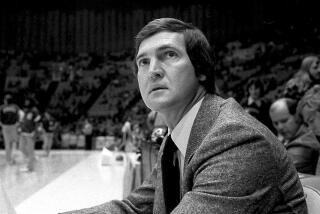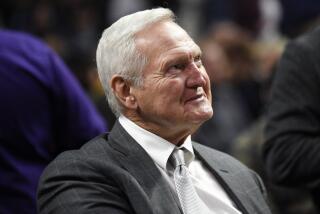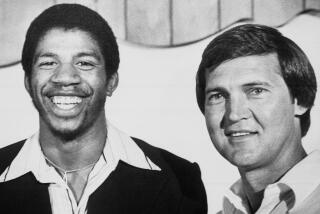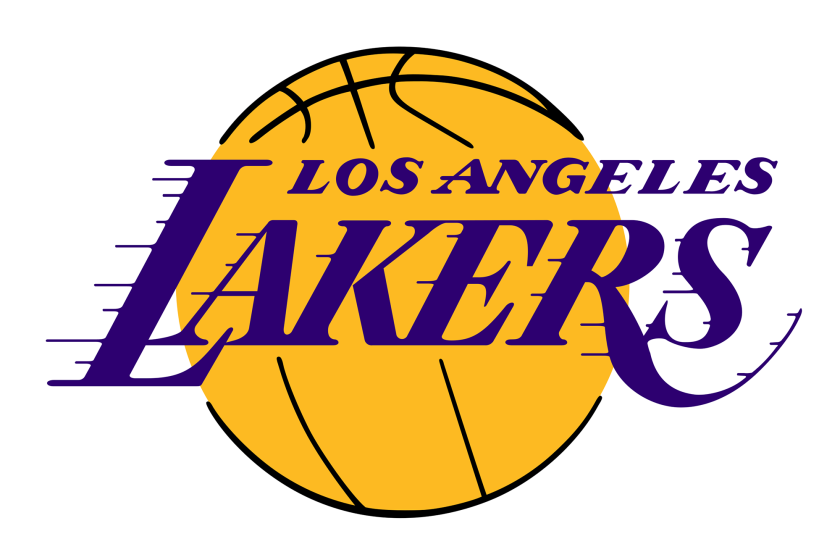Karl Malone’s Biggest Loss
Weeks before she died, Shirley Malone sat across from her son, Karl, in the kitchen of his ranch house, set on 5,000 acres of timber and ponds in southern Arkansas.
She was 64. Karl had been her youngest for 20 years, and then she had her last, a girl. Still, it was Karl who would forever be regarded as the baby, even if he would grow to 6-foot-9 and 260 pounds, with arms and shoulders almost as thick as the trees he felled and pulled through town on the beds of massive logging trucks.
It was late July, and Karl would leave soon for New York, for the start of practice for the Olympic qualifying team with a handful of other NBA superstars. Before that, he would soak every moment from beneath the shade tree in the yard in El Dorado, every creak from the porch swing, every sentiment from a family large in so many ways.
His mother recently divorced, Karl had bought her a new home in a nearby town, and as they spoke he suddenly asked, “Mom, what is your favorite color?”
“Burgundy,” she said, curious.
“What’s your dream vehicle?”
“A pickup,” she said.
A month later, Karl Malone laughed without sadness.
“I never knew, all these years, that my mom loved pickup trucks,” he said, his eyes turned at the corners, amused by how he’d arrived at the same preference as a boy.
Shirley Malone put a few miles on her burgundy pickup, some of them back and forth between her place and his, and died on Aug. 13 of a massive heart attack. Karl left the Olympic team before it played a game, buried his mother six days later and on Friday afternoon, lounging on a couch in the Newport Beach offices of his agent, Dwight Manley, said he would play his first season as a Laker “with a heavy heart.”
“I realize that things happen for a reason,” he said. “I’m Baptist. I grew up with my mom taking me to church. I’m not going to lie to you. Everybody says they never question God, knowing he never makes a mistake. But, have I looked around and seen women that are older than my mom? My mom didn’t drink, my mom didn’t smoke, my mom didn’t do any of that. Do I look around? Do I see people who are older and drinking and smoking and still living? Have I questioned God ‘Why me?’ Yeah. But, have I been upset about it? No. Because I realize that everything he does is for a reason. Do we understand it all the time? No.
“I was on such a high. A new situation. Different situation. Family’s great. Wife and kids great. Training for the Olympics. Just a high. And then, as high as I was, I’m just that low.... I know at the end of the day it’s positive. If I ever get the answer to why my mom, I’ll tell you. It was the toughest, man.”
It helps some that his mother, in the weeks before her death, Malone said, “was the happiest I’ve ever seen her.”
She took pleasure from Karl’s decision to leave the Utah Jazz after 18 years to sign -- at significant financial sacrifice -- with the Lakers, a move he’d discussed privately for years. When he returned to Arkansas from his public introduction at Staples Center, Karl recalled her telling him, “You never cease to amaze me.”
She delighted in Karl’s new happiness, with his new team and his new home in Newport Beach with the view of the Pacific Ocean, from where he’d call while knocking the sand from his sneakers. He turned 40 in July, celebrated with a cigar and a slug of red wine straight from the bottle, a rare break from a health regimen that would demolish men half his age, and among the blessings he counted was his mother’s health. So, it hurt.
On course to surpass Kareem Abdul-Jabbar’s all-time NBA scoring record and earn seven or eight times his Laker salary of $1.5 million if he’d stayed even one more year in Utah, Malone chose the Lakers of Shaquille O’Neal and Kobe Bryant and Phil Jackson, the Lakers of three championships in four years, the Lakers of long morning jogs along the beach.
He did not return to the Olympic qualifying tournament, but he intends to play in the Olympic Games next summer. He has not watched the tournament, having only recently been able to soften the hard edges of his grief.
“It just knocked everything out of whack,” Malone said of his mother’s death. “I didn’t think about basketball or nothing. I just thought about chartering a plane and getting to Arkansas. Even now, it brings back memories. So, I just haven’t watched it.”
Terry Malone, a year older than Karl, helps run Malone Properties back in El Dorado. He talks the way Karl would had Karl never left Arkansas, never gone off to Salt Lake City, never spent most of his lifetime in front of radio microphones and television cameras.
He is strong like Karl, less than three weeks after the death of Shirley having found comfort in her life, rather than lingering on the dank loneliness she’d left behind. It was Terry who took many of Karl’s telephone calls during the days in July when he’d offered to come play for the Lakers for so little, even as more lucrative offers from San Antonio, Dallas, Sacramento and Boston, among others, came in. Terry, whose phone rang as Karl walked into Staples Center for the news conference, smiling when Karl’s voice told him, “Turn on ESPN,” then disappeared. Terry, who has called Karl “Boo” since they were 3 and 4, because back when they shared a double bed Karl once had too much watermelon, which gets a young boy’s bladder to expanding and, well, “He boo-booed on me.”
“It’s El Dor-ay-do,” Terry said. “City people call it El Dor-ah-do. We call it El Dor-ay-do, ‘cause we country.”
With that, Terry was off, his speech hyper-Karl, in your face like Karl, friendly like Karl, trusting like Karl. He said he hasn’t come to Los Angeles yet, choosing to stay behind and help his brothers and sisters -- Shirley had nine children in all, Karl being the youngest of five boys -- over the loss of their mother. But, he said, it has pleased them all to know Karl has found peace, and to know that Shirley was around long enough to see that, at least.
“You know what, like I told Karl, me and him talk a lot, what I said, it hurt,” Terry said. “But, your momma lives through us. Me. Karl. She lives on. She lives on through all of us, through the grandkids and everybody. How I look at it, my momma would want us to look at the good things she did and move on. That’s how my momma lived. I ain’t going to say it don’t hurt, but, you know, that’s the only way to survive. What you going to do, grieve yourself to death?
“She was really happy, because all those years with the Jazz she always wanted him to win a championship. She was always a Laker fan. Me too. My mom always loved Magic and Kareem and all of them. That pretty much was what was going on with that. She loved the Lakers.”
Karl is dressed in a tank top and shorts. One of his favorite phrases has become, “Just because you’re in Hollywood doesn’t mean you have to act Hollywood,” and he laughs. When he signed with the Lakers, he knew he needed something new. He didn’t know how bad.
“All of this is medicine to me,” he said. “It’s helping me get through a difficult time. It’s just therapy for me. Psychologists and psychiatrists and all, they fine. But that’s not what I needed. I needed this. I needed this right here, like out of a movie, to hear the birds on the beach, like something you watch on TV. This ain’t real. I think about so much and get so excited.”
More to Read
All things Lakers, all the time.
Get all the Lakers news you need in Dan Woike's weekly newsletter.
You may occasionally receive promotional content from the Los Angeles Times.







